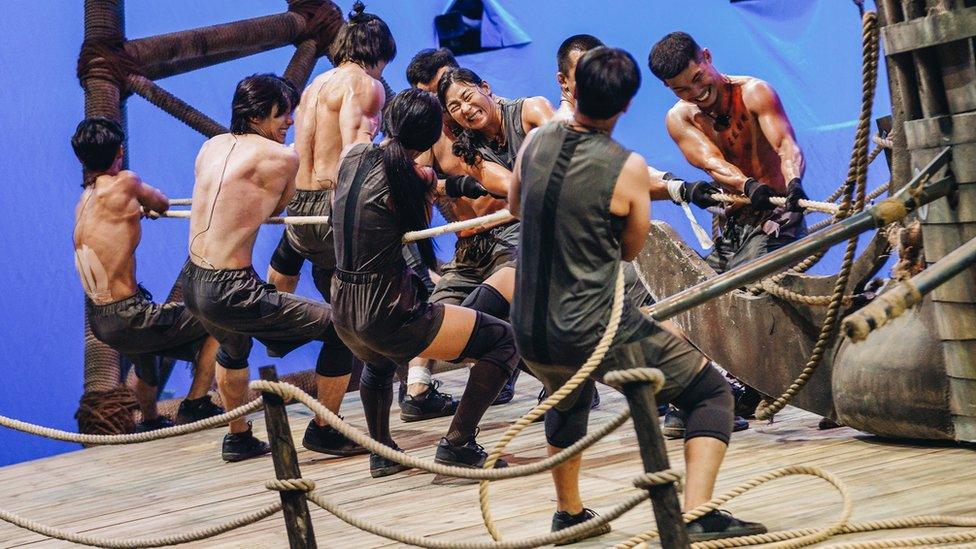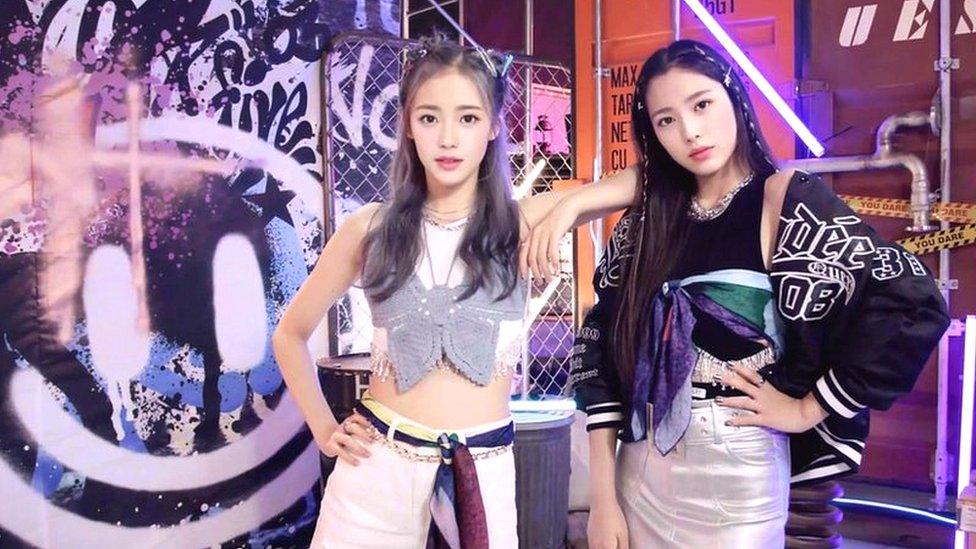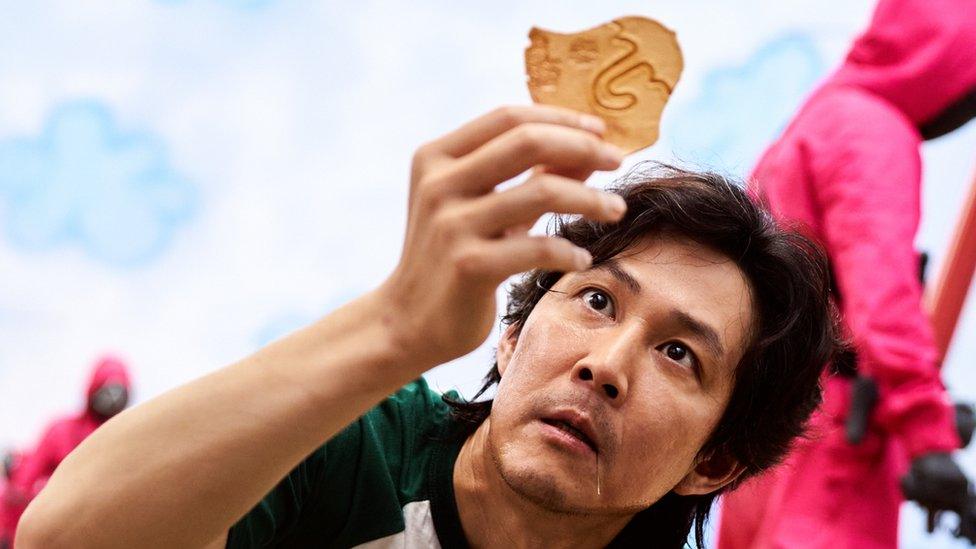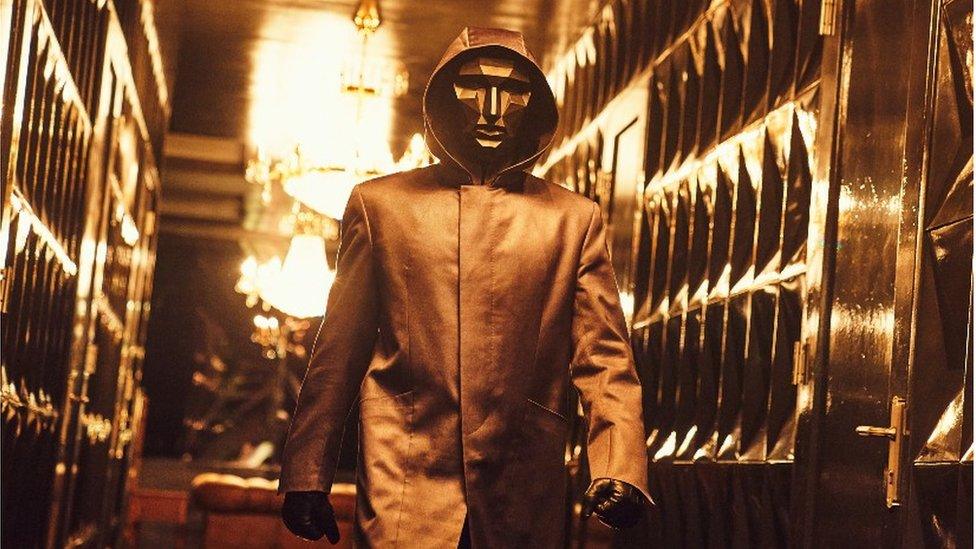Physical 100: Are K-reality shows the next Korean cultural trend?
- Published

Wrestler Jang Eun-sil and her team dragging a ship for one of their Physical 100 challenges
"Try again," yells female wrestler Jang Eun-sil to her exasperated teammates.
They need to push a 1,500kg wooden ship through sand and up a ramp, but the ship won't budge. Jang knows her team is the weakest on paper.
Then, to the tune of her rallying cries, the boat begins to inch forward. Over the next eight minutes, her team, grunting and crying, manages to drag it up the ramp to complete the task. Stunned, the contestants crumple to the floor, their ripped bodies soaked in sweat.
If you haven't been watching this show, this is my favourite moment from Netflix's latest blockbuster - Physical 100. The survival show brings together 100 of South Korea's best athletes, from all backgrounds, to compete for the title of most impressive body. There are Olympians, fitness influencers, a firefighter, and a prison guard. One of the show's most refreshing features is that men and women compete together.
It is a real-life Squid Game, except - spoiler - no-one dies. However, contestants have suffered broken ribs during filming.
Physical 100 has stormed Netflix's charts, becoming its most-watched non-English language show worldwide. It is the first reality show to ever take this top spot. It is currently the third most popular Netflix programme in the UK.
Given the domination of K-pop and K-dramas, this success might seem expected. But it isn't. Reality shows - or variety shows as they are known in Korea - have been popular for decades, but have never really broken through abroad.
Caught off-guard by the show's popularity, Netflix hastily pulled together 50 of its contestants to meet their fans along the river in Seoul earlier this month.
"I thought it would be popular, but not this big," laughed Jo Jin-hyeong, the colossal 41-year-old car dealer who stormed into the final five competitors by balancing a 50kg boulder on his shoulder for more than two hours.
"It was one of the hardest things I've done in my life," he admitted. "My entire body went numb, and my whole life passed in front of me. I just thought I cannot let go; I cannot lose."

The contestants of Physical 100 posed for fans at the event in Seoul last weekend
It was the chance to compete against the likes of Jo that convinced wrestler Jang Eun-sil to take part. "Having men and women participate together was novel," she said.
Throughout the afternoon, the stars entertained their fans with backflips, while frequently shedding their tops to flex their biceps. They know their audience.
"I watch because there are lots of hot people," said 25-year-old Hari. "Me too, that's the main reason," laughed her friend Da-hyun. But hotness aside, the pair are excited by the show's global success.
"Everyone knows Korea now, it's really cool. And it is not just about K-pop anymore, this is showing another side of our country," they agreed.
Fans abroad have been charmed by the camaraderie. At one point, the final two contestants spur each other on to complete the gruelling task of tugging a seemingly never-ending rope.
"I think our foreign fans found these moments beautiful," said Jang. "It's the Korean way," said Jo.
Variety shows have long been essential viewing in Korean homes, uniting children, parents and even grandparents. The networks compete fiercely to make theirs the most unique and entertaining, continuously pumping out fresh ideas.
The quirky genre consists of game shows, talent contests and fly-on-the-wall access to people's lives. It is light-hearted viewing, served up with celebrities and, more often than not, an opinionated but witty panel of guests. In the show "My Little Old Boy" celebrities' mothers provide commentary on their sons' behaviour.
The shows are unashamedly made for Korean audiences, and, according to award-winning director-producer Heo Hang, they are often "too Korean" - there is too much talking and words on the screen, which makes them hard to translate and digest.
Heo has invited me behind the scenes of her hit production "I Live Alone", which has been running for 10 years. The show follows a celebrity for the day, who lives alone. A panel of equally famous people are then invited into the studio to watch the footage, while providing cutting commentary.

The BBC was invited behind the scenes of another popular K-reality show, I Live Alone
On this occasion actor Lee Jang-woo spends his day cooking Vietnamese food, watched over by a star-studded panel, including Key from the K-pop band Shinee. Lee then unexpectedly pulls out the cake they have just watched him prepare - only it is filled with meat.
I can't work out why, but it is hilarious. The cast and crew are in pieces.
"People love our show because they see that celebrities' daily lives are not that different to theirs. And we have no scripts, so it is very real," Heo says.
In a country where more than a third of households are people living alone, the show taps into something uniquely Korean. "I guess it is not as easy for foreigners to relate to our lives" Heo adds.
The shows might not translate well, but the ideas do, meaning for years Korean companies have sold their formats abroad to be remade. The US hit, The Masked Singer, which has celebrities conceal their identities while they perform, is a South Korean export. Its producers have sold the rights to more than 50 countries.
With Physical 100, Netflix has flipped the script, investing in the Korean version of the show instead.
Netflix knew it had a captive audience, thirsty to learn more about Korea, their appetites whet by the likes of Squid Game and Extraordinary Attorney Woo. Last year an astonishing 60% of all Netflix members watched a Korean programme.
Streaming platforms also have a model TV channels cannot compete with. By filming entire shows ahead of release, they can subtitle and dub the episodes, and push them out to viewers around the world simultaneously, creating a global buzz.
Korean reality is "shaping up as the next big K-content trend," says Yoo Ki-hwan, the unscripted content manager for Netflix in Korea.
South Korea's entertainment industry is also watching with excitement. The networks here once viewed Netflix and the other streaming platforms suspiciously, as competitors. Now they are potential partners.
Last week Amazon Prime bought its first K-reality show, Jinny's Kitchen, which follows a group of celebrities as they attempt to set up a Korean street food restaurant in Mexico.

Jinny’s Kitchen in Amazon Prime’s first K-Reality show
Its creator, Nah Yung-suk, is one of South Korea's most acclaimed reality TV producers, from the media giant CJ ENM. Nah said he had never thought about foreign viewers before. With Jinny's Kitchen he simply set out to make the most entertaining show for his Korean audience.
But Physical 100 has changed the way he thinks. Suddenly he sees opportunities. The secret to capturing global fans he thinks is using celebrities. Jinny's Kitchen stars V from BTS as the restaurant intern.
"Honestly, now I really want foreign audiences to love my show. If they don't find it fun or entertaining, then I will look at changing my formats. Maybe I'll have to make a survivor show," he joked.
The industry is primed for a global breakthrough. At CJ ENM there are 200 producers scratching their heads daily to come up with new ideas. If the streaming platforms buy into those ideas, it means more money, which will translate into bigger and better shows. At least that is the promise.
"For the first time we're thinking huh, this is really possible, foreign audiences can enjoy Korean reality shows," said Nah.
Related topics
- Published12 December 2022

- Published1 October 2021

- Published16 October 2021
